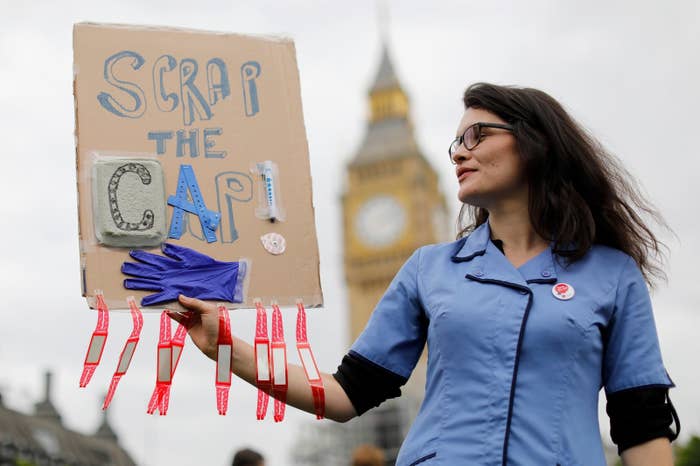
Police officers, firefighters, and nurses are between £2,000 and £3,500 a year worse off compared to when the Tory-Lib Dem coalition formed in 2010, analysis of official figures by BuzzFeed News has revealed.
The coalition government instituted a two-year public sector pay freeze covering 2011 and 2012 that was then replaced with a maximum 1% average pay rise for most public sector workers.
The policy, which was introduced as part of a range of austerity measures, was due to be extended until at least 2019, but this week the government came under renewed pressure to end the pay cap in the Budget later this year.
Ministers and officials have signaled that the policy is likely to change over the summer, and the clearest hints yet that it will end came this week. On Sunday there were reports the government is to lift the cap for the first time for both police and prison officers, paving the way for the cap to be lifted in other sectors.
Labour leader Jeremy Corbyn called for public workers to get a pay rise this autumn at last week's Prime Minister's Questions, as nurses campaigned for a rise outside parliament. Elsewhere, Scottish first minister Nicola Sturgeon said she would scrap the pay cap in Scotland from next year, while the PCS union has threatened industrial action if the cap is not ended.
BuzzFeed News has analysed official figures to assess the impact of the pay freeze on a range of public sector workers. Because in most years the 1% pay rises on offer were less than inflation – the official measure of how much prices are rising – public employees have become steadily worse off each year, leaving them on average 9.1% worse off in 2017 than they were in 2010.
For an average police officer, this is the equivalent of losing £3,494 in salary versus 2010. For a firefighter it's a hit of £2,424, nurses are on average around £3,111 worse off, and junior civil servants (at a grade referred to as "executive officer) are down £2,243.
Jonathan Cribb, senior research economist at the Institute for Fiscal Studies, said the pay freeze and cap policies had partly been intended to stop public sector wages rising when private sector pay was still falling in the first years of the financial crisis that began in 2008 – but that the situation had now changed.
"Since 2008, the pay of both public and private sector workers has fallen by about 5%, after adjusting for inflation," he told BuzzFeed News. "If the Conservative government continues to implement only 1% increases in pay, public sector pay will fall behind private sector pay, which is currently growing around 2% per year, making it harder to recruit public sector workers."
Cribb also noted that simply giving workers pay rises at the rate of inflation – currently 2.6%, or more than twice the present cap – would not restore any of the income public workers have lost in the last seven years.
"In order for the real pay of public sector workers to get back to its 2008 level, the government would need successive years of pay rises above inflation, not just in line with inflation," he said.
Speaking roughly, to get back to 2008 pay levels, public sector employees would need at least five years of pay rises of at least 1% point more than inflation – meaning pay rises of around 3.6% this year. To return to 2010 levels, which is when public sector pay was at its highest in real terms, would take even longer.
